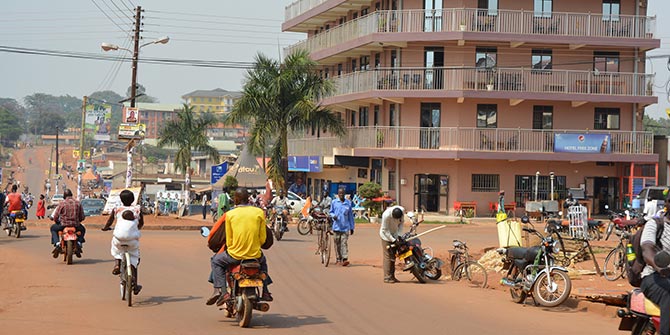Hilary Stauffer analyses how the trial of Saif Gaddafi fits into modern notions of international justice.
Recent reports that Saif Gaddafi has been sentenced to death by a court in Tripoli have unnerved lawyers and laypeople alike, causing discomforting ruminations about the concept of a ‘justice’. While many observers will welcome the news that someone from the Gaddafi family is being forced to atone for its collective sins, the end result is neither a victory for the cause of institutional justice nor a confirmation that post-revolutionary societies should be encouraged to immediately rush into the business of nation-building.

Those who are supporters of retributive justice may see capital punishment as the only reasonable sentence that could have been imposed. After all, the Gaddafi regime was responsible for countless deaths, of both its fellow compatriots and citizens of many other nations as well. At least 1200 Libyans are thought to have perished in the 1996 Abu Salim prison massacre alone. The 1988 bombing of Pan Am Flight 103 over Lockerbie, Scotland—killing 270 people—is also widely attributed to Colonel Gaddafi (although some conspiracy theorists continue believe there were others at work). Then there are the untold numbers of civilian casualties which resulted from Libya’s financing of wars in Sierra Leone and elsewhere throughout the 1990s. Against such a backdrop, sentencing the second son of the ‘Mad Dog of the Middle East’ to death by firing squad seems like a predictable outcome.
Such an inference, of course, requires that we ignore the fact that the death penalty is very much in contravention of widely accepted norms of international human rights. But it also requires wilful disregard for the fact that Saif Gaddafi is not implicated in nearly any of his father’s alleged offenses; throughout much of the time when the Libyan leader was an international pariah, Saif was a self-described ‘normal’ student (albeit, a student with a fondness for keeping pet tigers). After the West’s rapprochement with Libya in the early noughties, the dictator’s most outwardly refined offspring was welcomed at Davos and other exclusive gatherings where the rich and (in)famous hobnob together. Technically, the verdict against him was imposed for alleged crimes committed against protestors during Libya’s 2011 revolution, but everything about this trial smacks of vengeful retaliation for historical grudges.
It is hard to think of a less-sympathetic poster child for the proposition that Lady Justice should be objective and impartial. Saif Gaddafi is a prominent representation of a hated dictatorial regime, one that forced school children to attend public hangings, meddled violently in the affairs of its neighbours, and actively sought weapons of mass destruction. Even if he did not actively participate in his father’s misdeeds, he clearly benefited from the Colonel’s iron-fisted rule of Libya—enjoying the financial largesse it provided, if nothing else. He reportedly enjoyed a lavish lifestyle in a £10 million mansion during his student days in London, a far cry from the international student dorms of his classmates.
Nevertheless, for any latter-day Cromwellian reformers out there, it is important to remember that simply being a degenerate playboy that profits from the oppression of your fellow citizens is not grounds enough to impose the death penalty. If it were, London property prices would be much more affordable. Rather, over several centuries spent tweaking our collective notions of what ‘justice’ represents, we have decided that it is both sensible and fair to hold people liable only for those crimes for which the evidence indicates they are personally responsible. Saif Gaddafi may very well be guilty of crimes against humanity, as he has been accused of by the International Criminal Court. But the trial held in Tripoli—marred as it was by reports of widespread procedural irregularities and allegations of evidence obtained by torture—gets us no closer to a definitive finding in that regard.
Unfortunately, such show trials—carried out in the extremely chaotic climate of post-revolution Libya—demonstrate only that the very human instinct to settle old scores can persist long after the immediate threat has disappeared. No one faults the Libyan people for their desire to cast-off the legacy of tyranny and subjugation they endured at the hands of the Gaddafi family. But part of Libya’s recovery and evolution must be a repudiation of the erratic governmental edicts of the Gaddafi era. The establishment of an impartial and independent legal system will reassure its citizens that there are predictable standards of justice that are applicable to everyone, a quotidian luxury they have not enjoyed for the past 40 years.
The reality of Libya’s fragmented and violent present circumstances may not currently allow for such platitudes. Yet think of what an important symbolic message it would send if the regeneration of this strategically important country began with the fair and objective criminal trial of one of its most hated citizens. Libya, you can do better. Yalla.
Hilary Stauffer is a Visiting Fellow at LSE’s Centre for the Study of Human Rights. She is an international lawyer with extensive experience working on projects in the U.S., Europe, Africa, and Asia. Her specialties include International Law, Rule of Law, Human Rights, Humanitarian Affairs and Diplomacy.
The views expressed in this post are those of the authors and in no way reflect those of the Africa at LSE blog or the London School of Economics and Political Science.





